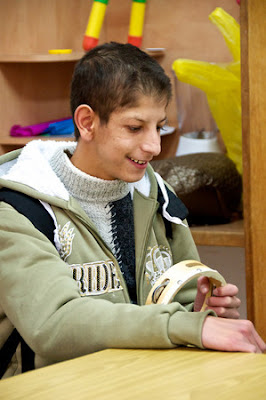Today the room seems smaller than ever and I notice some new faces: some women that live above Kaziyeh join the workshop today. Maram, one of the new women, starts dancing and jumping in the middle of the room when she sees the guitar.
While the girls are finding a place to sit on the couches, I put a chair for myself. Khoula immediately sits on the chair. Khoula, the girl that looked angry during the last two workshops and didn't say a word. I thought she did not like the music, or me, or the guitar, or my clothes, or anything in the world.
I take another chair and put it next to her. I take out the guitar, and Khoula gets even closer. She tries to touch the guitar. Her supervisor tells her to leave it, because she is afraid Khoula would break the guitar. But I tell her it is fine, the guitar is strong and Khoula can touch the strings. While she puts her left arm around my shoulder, she starts striking the guitar strings with her right hand. Slowly she makes sounds, smiling and looking comfortable.
One hour of singing, listening, playing and dancing follows. Khoula's involvement and smile is bigger than ever!
Before this workshop I visited Eber, a group of 6 young boys and girls with special needs. We are working together since two months, and the children are really amazing. Miri and Sabah, their teachers, are always singing and dancing enthusiastically with the children. Today we started to write our own song. On a given melody, the children came up with words. This is a long process, because some of the children don't even talk and I don't understand all the Arabic...But with the help of Sabah and Miri, we finished the first lines. Inspired by the song-writing, Sabah suggested a rap. The children did not know what rap means, so Sabah started to rap...the children couldn't stop laughing and we had lots of fun. I promised them to bring a real rapper from Bethlehem for the next workshop!
Thank you Maarten for making the beautiful pictures.
Thank you Maarten for making the beautiful pictures.
 |
| Haneen, receiving a drop of water on her hand before the water drop dance! |
 | ||||
| Anwar playing the tambourine |
 |
| We were all excited that we found a castanet in the color of Salem's jacket! Salem speaks perfect Arabic and English and sings all the songs in tune. He is a great musical talent! |
















